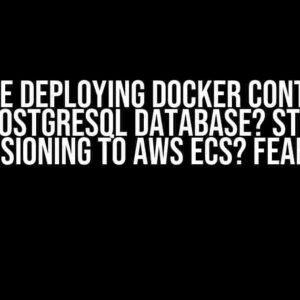Are you tired of duplicating efforts and writing redundant code in your GitLab CI/CD pipelines? Do you struggle to maintain consistency between your `.gitlab-ci.yml` and `docker-compose.yml` files? Worry no more! In this comprehensive guide, we’ll show you how to pass arguments from `.gitlab-ci.yml` to `docker-compose.yml`, streamlining your development workflow and taking your CI/CD game to the next level.
What’s the Problem?
When working with GitLab CI/CD and Docker Compose, you often need to share configuration values or environment variables between your `.gitlab-ci.yml` and `docker-compose.yml` files. This can become a maintenance nightmare, especially when dealing with complex pipelines and multiple services. The good news is that there’s a way to pass arguments from `.gitlab-ci.yml` to `docker-compose.yml`, making your life easier and your code more efficient.
Understanding the Basics
Before we dive into the solution, let’s quickly review the basics:
.gitlab-ci.yml: This file defines the GitLab CI/CD pipeline, specifying the stages, jobs, and scripts to execute.docker-compose.yml: This file defines the Docker Compose configuration, detailing the services, volumes, and networks for your application.
In a typical pipeline, you might use environment variables or configuration files to share data between these two files. However, this approach can lead to duplication and inconsistencies. That’s where argument passing comes in.
Passing Arguments with `docker-compose` Command
The first approach to passing arguments from `.gitlab-ci.yml` to `docker-compose.yml` involves using the `docker-compose` command with the `–env` or `-e` flag. This allows you to set environment variables that can be accessed within your `docker-compose.yml` file.
stages:
- build
- deploy
variables:
DB_HOST: "localhost"
DB_PORT: "5432"
build:
stage: build
script:
- docker-compose --env DB_HOST=$DB_HOST --env DB_PORT=$DB_PORT up -d
In the above example, we define two variables `DB_HOST` and `DB_PORT` in the `.gitlab-ci.yml` file. We then use the `docker-compose` command with the `–env` flag to set these environment variables, making them available within the `docker-compose.yml` file.
Passing Arguments with `docker-compose config` Command
The second approach involves using the `docker-compose config` command to generate a YAML configuration file that can be consumed by your `docker-compose.yml` file.
stages:
- build
- deploy
variables:
DB_HOST: "localhost"
DB_PORT: "5432"
build:
stage: build
script:
- docker-compose config --dotenv .env
- docker-compose up -d
In this example, we use the `docker-compose config` command to generate a YAML configuration file based on the environment variables defined in the `.gitlab-ci.yml` file. The resulting file can then be used to configure your Docker Compose services.
Using Environment Files
Another approach to passing arguments from `.gitlab-ci.yml` to `docker-compose.yml` is to use environment files. This involves creating a separate file that contains key-value pairs that can be consumed by both files.
stages:
- build
- deploy
env_file:
- .env
build:
stage: build
script:
- docker-compose up -d
In this example, we define an `env_file` in the `.gitlab-ci.yml` file, pointing to a separate `.env` file that contains our environment variables. Both the `.gitlab-ci.yml` and `docker-compose.yml` files can then access these variables.
Using Anchors and Extensions
Docker Compose provides a powerful feature called anchors and extensions, which allows you to define reusable configuration blocks that can be imported into your `docker-compose.yml` file.
# docker-compose.base.yml
version: '3'
services:
db:
image: postgres
environment:
- DATABASE_URL=postgres://${DB_HOST}:${DB_PORT}/database
# docker-compose.yml
version: '3'
services:
app:
build: .
environment:
- DATABASE_URL:${DATABASE_URL}
depends_on:
- db
db:
<<: *db
environment:
- DB_HOST:${DB_HOST}
- DB_PORT:${DB_PORT}
In this example, we define a `docker-compose.base.yml` file that contains a reusable configuration block for our database service. We then import this block into our `docker-compose.yml` file using anchors and extensions, allowing us to reuse the configuration and pass arguments from the `.gitlab-ci.yml` file.
Conclusion
Passing arguments from `.gitlab-ci.yml` to `docker-compose.yml` is a crucial aspect of building efficient and scalable CI/CD pipelines. By using one of the approaches outlined in this article, you can streamline your development workflow, reduce duplication, and maintain consistency between your pipeline and Docker Compose configurations. Remember to choose the approach that best fits your use case, and don't be afraid to experiment with different methods to find the one that works best for you.
| Approach | Pros | Cons |
|---|---|---|
| Passing arguments with `docker-compose` command | Easy to implement, flexible | Limited to environment variables, may lead to duplication |
| Passing arguments with `docker-compose config` command | Generates a YAML configuration file, flexible | May require additional scripting, complex configuration |
| Using environment files | Decouples configuration from pipeline, easy to maintain | Requires separate file management, may lead to versioning issues |
| Using anchors and extensions | Reusable configuration blocks, flexible | Requires additional configuration files, may be complex |
By following the guidelines outlined in this article, you'll be able to unlock the full potential of your GitLab CI/CD pipeline and Docker Compose configuration, taking your development workflow to new heights.
Additional Resources
Happy coding, and don't forget to share your own experiences and tips in the comments below!
Frequently Asked Question
Get ready to unleash the power of GitLab CI/CD and Docker Compose! If you're struggling to pass arguments from your .gitlab-ci.yml file to your docker-compose.yml file, you're in the right place. Here are the answers to your burning questions:
How do I pass environment variables from GitLab CI/CD to my Docker Compose file?
You can pass environment variables from your .gitlab-ci.yml file to your docker-compose.yml file using the `environment` keyword. Simply define the variables in your .gitlab-ci.yml file, and then reference them in your docker-compose.yml file using the `${VARIABLE_NAME}` syntax. For example, in your .gitlab-ci.yml file, you can define a variable like this: `variables: DB_HOST: 'localhost'`. Then, in your docker-compose.yml file, you can reference the variable like this: ` environment: - DB_HOST=${DB_HOST}`.
Can I use GitLab CI/CD variables in my Docker Compose file?
Yes, you can! GitLab CI/CD provides a set of predefined variables that you can use in your .gitlab-ci.yml file. These variables are available as environment variables in your Docker Compose file. For example, you can use the `CI_ENVIRONMENT_NAME` variable to set the environment for your Docker Compose service. Simply reference the variable in your docker-compose.yml file like this: `environment: - CI_ENVIRONMENT_NAME=${CI_ENVIRONMENT_NAME}`.
How do I pass command-line arguments from GitLab CI/CD to my Docker Compose file?
You can pass command-line arguments from your .gitlab-ci.yml file to your docker-compose.yml file using the `command` keyword. For example, if you want to pass a `-d` flag to your Docker Compose command, you can define the command in your .gitlab-ci.yml file like this: `command: docker-compose up -d`. Then, in your docker-compose.yml file, you can reference the command like this: `command: ${COMMAND}`.
Can I use anchors to pass variables from my Docker Compose file to my GitLab CI/CD file?
Unfortunately, no. Anchors are a Docker Compose feature that allows you to reuse configuration blocks in your docker-compose.yml file. While anchors are a powerful tool for avoiding duplication in your Docker Compose file, they don't provide a way to pass variables from your docker-compose.yml file to your .gitlab-ci.yml file.
What's the best way to handle sensitive data like passwords and API keys in my Docker Compose file?
When it comes to sensitive data like passwords and API keys, it's essential to keep them secure. One way to do this is to store them as environment variables in your .gitlab-ci.yml file, and then reference them in your docker-compose.yml file. You can also use Docker Compose's built-in support for environment files to store sensitive data. For example, you can create a `.env` file with your sensitive data, and then reference it in your docker-compose.yml file like this: `env_file: .env`.



